
JULIA LEE BARCLAY-MORTON – YOGA, WATER AND REWRITING AUTISM
I interviewed writer Julia Lee Barclay-Morton about her experience of autism. Julia began as an experimental dramatist in New York, moving to the UK to
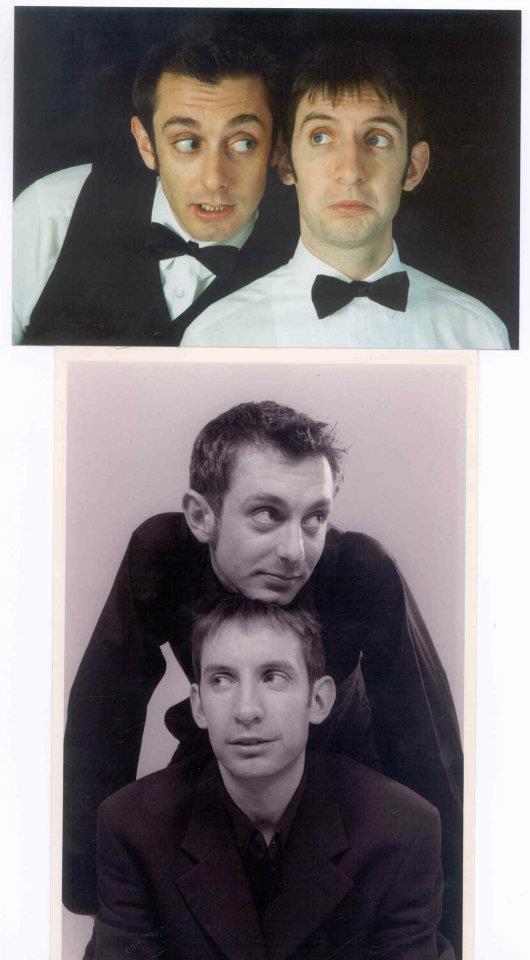
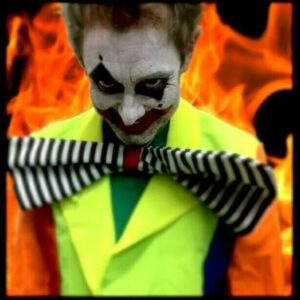
I asked actor, writer, artist and comedian Cy Henty about his stage career – including touring with Russell Brand and a run at The Pleasance Theatre, Edinburgh. Cy has starred in thought-provoking and sometimes scarily-absurdist films, playing the part of a manic gameshow host in a conch codpiece in one, and a policeman with an imperial moustache in another. Behind this, in his personal life, Cy is a people person, an ex-Mental Health Occupational Therapist and a passionate father who likes working in duos.
In a revealing three-part interview, Cy gave a frank account of what it’s like to work as an actor and caring individual in the hectic world of alternative stand-up and horror/comedy.
Leslie: What were the signs during childhood that you might end up in the expressive arts?
Cy: When I was a boy my sister used to dress me up and we would act out sketches from our imagination. My mum and dad were always anarchic and playful, they encouraged our imaginations, but most of all our sense of humour. Monty Python was a coming-of-age, as was Blazing Saddles – both came from my Dad. On the other side we had Mum reading us Edward Lear and Spike Milligan’s ‘Milligananimals’. I was extremely lucky to have such imaginative and playful parents in a lot of respects. Life is never rosy and living on the edge and appreciating the absurdity of life does not make living in the accepted form of reality easy. Mum and Dad were passionate and irrational creatures at times. But they came honestly to the world and faced each other on that battlefield I believe. To me, now, looking back I couldn’t imagine being raised by anyone else but them. I wouldn’t be me without the madness. water fights, fir cone fights, explorations into uncharted territory, fear, love, art, jazz music, dancing and paganism! They made me and my sister – we are who we are and we can’t help it. My sister is a lot stronger than I am but just as imaginative and creative. I wish I had her strength.
Leslie: Can you tell me how your interest in horror films and horror-comedy first began?
Cy: My love of the genre stems from boyhood when I read Edgar Allan Poe’s Tales of Mystery & Imagination and listened to them on a set of story-tapes read by Christopher Lee in his wonderful rich, deep, sonorous voice. During my youth, I discovered H.P. Lovecraft and enjoyed the high-camp and bright red blood of Hammer Horror, black and white 50’s Sci-fi (‘The Day the Earth Stood Still’ etc) and a lot of 70’s and 80’s horror / Sci-fi.
I always liked the baddies as a child – I wanted to be Darth Vader in the playground – and Christopher Lee’s Dracula, of course. I really think that as a sensitive and compassionate, gangly, accident-prone and awkward boy with a silver tooth (I had managed to knock one of my first adult teeth out running up some concrete steps at around aged five), with bottle-end NHS Glasses and a bowl-haircut, who was great at drawing but awful at sport – the lure of the ‘dark side’ or bad guys in fiction was precisely because they represented something so completely different from me. If I had known as a teenage boy that I would go on to act in independent horror films I would have grinned widely at the prospect! However I’m pretty sure one of my best roles has been as a bumbling and friendly policeman in Al Ronald‘s ‘Harriet’s War’ as opposed to any villains I’ve played. Playing the psychopathic ‘Tick-Tock’ in Mark Crane’s ‘Tick Tock Trilogy’ was quite a scary role I think though, and I did recently get to play a Teacup Poisoner on a Ghost Walk for a friend and was told I was terrifying.
Leslie: Can you tell us about the other arm of your career – your work as a comedian?
Cy: I always loved writing comedy and performing, although NEVER as myself – that to me is one of the most terrifying things. I am pretty much strictly a character actor / comedian. Even at Infant school I wrote comedy plays for puppets which my friend and I used perform in front of the whole school. Roll forward to Secondary school and I had my own comedy band for which I wrote most of the lyrics and performed with in assemblies.
For me it was never about just the performing though, but creating a whole world. We had backstories for the characters and worked on album covers as well. At this point I was already writing reams of prose and poetry which I illustrated, filling up exercise books I’m guessing I got from my Mum who was a teacher!
Performing was always the last step – and the scariest – although I think performing your own material is much scarier than performing other people’s.
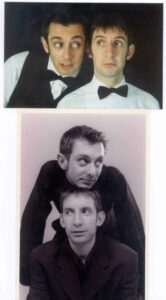
Leslie: I think you’ve been in a lot of comedy double acts. Can you tell us about them?
Cy: When I think about it I’ve always been in double acts, from the puppet shows to the comedy band – which was mostly me and my schoolboy Goth friend who was a talented musician struggling to fit my poetry to music! And at University I wrote surreal pieces for the magazine and made short films with my friend Neil. My friendship with Sam Ball also began at university. Sam and I were lucky enough to perform alongside some of the greats on the comedy circuit in the nineties and tour universities with Russell Brand before playing at The Pleasance Edinburgh Festival in 2001 with our show ‘Unhinged.’ For the last 15 years I’ve been in another double act, ‘The Electric Head’, with my comedy partner Al Ronald – and we’ve had some successes like a pilot we made with the producer of The Mighty Boosh and meetings at Radio 4 – and I’ve worked on projects with many other collaborators such as animations with Molly Brown and putting comedy songs to music with Lobby Lud.
Leslie: So why double acts?
Cy: I love working with someone – I’m a social creature! But perhaps it has to do with self-confidence too. With Sam Ball and Al Ronald it was possibly to do with the fact that my mind can be quite manic and surreal and I often find it hard to shape or edit things into a language that others understand. The creative process for me can be an all-consuming, obsessive one and there is often a stream of consciousness that I have described as akin to having a biro stuck into my brain, with the thoughts flowing out onto the page like ink… in fact I think sometimes it’s a release to get them out, get them down on the page. If you can bounce ideas back and forth – or have someone you trust tell you the truth – ‘That bit doesn’t make any sense Cy – how about this-‘ it becomes a far less fearful process.
Leslie: But we all need a day job. Can you tell us about yours?
C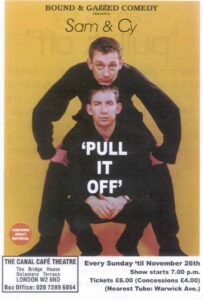 y: When I left University I went to work at a huge, old Victorian psychiatric hospital in Brentwood Essex. It was my first ‘proper’ job – I had moved there to pursue ‘Sam and Cy’ my first comedy double act and Sam Ball’s Mum had helped to get us jobs as Occupational Therapy Assistants there. It was an imposing red-brick ‘Asylum’ up on the hill and I was thrown into a department which I basically ran on my own, attached to an Assessment Ward. It was an incredible time and really opened my eyes, not only to the stigma surrounding mental health and the ignorance of others, but also to the pain and suffering of those dealing with its symptoms.
y: When I left University I went to work at a huge, old Victorian psychiatric hospital in Brentwood Essex. It was my first ‘proper’ job – I had moved there to pursue ‘Sam and Cy’ my first comedy double act and Sam Ball’s Mum had helped to get us jobs as Occupational Therapy Assistants there. It was an imposing red-brick ‘Asylum’ up on the hill and I was thrown into a department which I basically ran on my own, attached to an Assessment Ward. It was an incredible time and really opened my eyes, not only to the stigma surrounding mental health and the ignorance of others, but also to the pain and suffering of those dealing with its symptoms.
At the Assessment Ward I had a group, sometimes of up to 10 or more patients, with a variety of diagnosis from schizophrenia to bipolar to alcohol-induced psychosis, depression caused by bereavement and dementia. I would go around the ward in the morning and talk with and gather my group and once I had them we would usually throw the book out the window and just have fun. Activities seemed to have been written on some yellowing timetable from the 1950s and included listening to Max Bygraves and Bingo. Someone had forgotten that these were intelligent human beings! We made up our own games. One particular session I remember at a tea-break became a murder mystery investigation measuring the trajectory of an imagined bullet. We imagined that the heads of the hospital were trying to get rid of me for veering off the timetable and allowing the patients to have too much fun. Of course there were tragedies too and a lot of pain. Eventually when my comedy partner became anxious and quite depressed, and a patient I was close to killed himself it was too much to bear and I had to leave. At this point it felt like my dream of pursuing a career in comedy was falling apart along with my life. I was drinking too heavily and I ended up working in an administrative job for a branch of British Gas.
However… in those days they used a number of Fax-machines to receive jobs from other departments and it became my job to monitor and file these; at the same time I had begun writing about my experiences at the hospital. It was a very lonely job as I was set apart from the rest of the office and in an attempt to reach out I decided to create a secret identity for myself as ‘The Faxman’ and subversively fax poetry and artwork in this guise to the other offices up and down the country. This at least kept me happy and was the beginning of my novel.
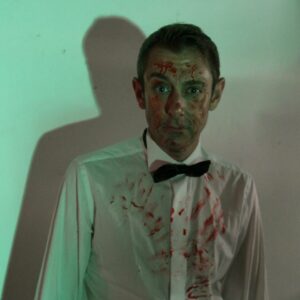
Things went downhill with drink and a bad relationship and I ended up working in a hinge factory. (Hence the eventual title of our eventual Edinburgh Show ‘Unhinged‘ – relating to both experiences in mental health and this job.) It was then I met my first wife, and my son was born shortly afterwards. I was 26. I knew once my son was born that I had to get myself a better job, so I went back to the only thing I had experience of which was Occupational Therapy (this time working with adults with autism and challenging behaviour). At the same time, after two years, I finally got back in contact with my comedy partner Sam Ball. Luckily a mutual friend, and a great actor, Paul Battin, who had directed our double act right from university, arranged a meeting. So after work once a week we would improvise in Sam’s dad’s warehouse and on the train I would begin jotting down material. Unfortunately at the same time my wife suffered from terrible post-natal depression so I had to give my job up to care for her and my son. I became determined to make the comedy work this time. This meant getting up with my son early in the morning and looking after him and his mum all day and then once he had gone to bed, sitting at the typewriter through the night.
Leslie: So how did you get back into the comedy circuit?
Cy: Eventually after a string of successful shows Sam Ball and I got an agent in London who at the time also handled Craig Charles of Red Dwarf, Russell Brand, Karl Theobold and Omid Djallili. Finally it seemed my dream was coming true and I would also be able to support my wife and son doing something that I loved…
Next week, in Part Two, Cy Henty talks about his tour with Russell Brand, his run at The Pleasance Theatre and his character work in indie films.
ABOUT LESLIE TATE’S BOOKS:

I interviewed writer Julia Lee Barclay-Morton about her experience of autism. Julia began as an experimental dramatist in New York, moving to the UK to

I interviewed Gillean McDougall from Glasgow, who edited the collaborative projects Honest Error (on Charles Rennie Mackintosh and his wife Margaret Macdonald) and Writing the

I interviewed French writer Delphine de Vigan, whose book, No et moi, won the prestigious Prix des libraires. Other books of hers have won a clutch

I interviewed Joanne Limburg whose poetry collection Feminismo was shortlisted for the Forward Prize for Best First Collection; another collection, Paraphernalia, was a Poetry Book Society Recommendation. Joanne

I interviewed Katherine Magnoli about The Adventures of KatGirl, her book about a wheelchair heroine, and Katherine’s journey from low self-esteem into authorial/radio success and
| Cookie | Duration | Description |
|---|---|---|
| cookielawinfo-checkbox-analytics | 11 months | This cookie is set by GDPR Cookie Consent plugin. The cookie is used to store the user consent for the cookies in the category "Analytics". |
| cookielawinfo-checkbox-functional | 11 months | The cookie is set by GDPR cookie consent to record the user consent for the cookies in the category "Functional". |
| cookielawinfo-checkbox-necessary | 11 months | This cookie is set by GDPR Cookie Consent plugin. The cookies is used to store the user consent for the cookies in the category "Necessary". |
| cookielawinfo-checkbox-others | 11 months | This cookie is set by GDPR Cookie Consent plugin. The cookie is used to store the user consent for the cookies in the category "Other. |
| cookielawinfo-checkbox-performance | 11 months | This cookie is set by GDPR Cookie Consent plugin. The cookie is used to store the user consent for the cookies in the category "Performance". |
| viewed_cookie_policy | 11 months | The cookie is set by the GDPR Cookie Consent plugin and is used to store whether or not user has consented to the use of cookies. It does not store any personal data. |
4 responses
Fab interview! 🙂
Thanks Debby! 🙂 🙂 🙂
A very interesting interview, Leslie. Success in the arts is definitely hard to achieve. You really have to work at it.
Yes indeed, Robbie. 99% perspiration! L x